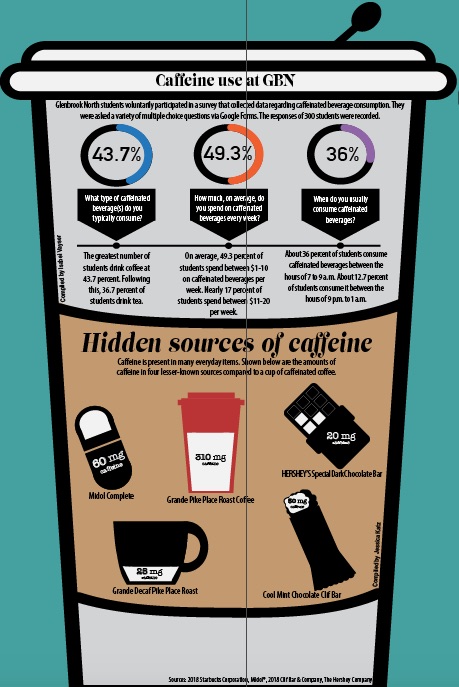Students embrace caffeine culture
The difference between coffee and water is clear — literally. To sophomore Abby Parry, however, drinking coffee is almost like drinking from a water bottle.
Parry said she tried coffee for the first time in seventh grade due to pressure from her friends, but initially decided it tasted too bitter.
“I thought [the coffee] was really gross, but it was kind of like the fad and the trend, and everyone was [drinking] it so I was like, ‘I’m just going to suck it up and make it look like I like it,’” Parry said.
Marilyn Cornelis, Ph.D., assistant professor of preventive medicine at Northwestern University, said in a phone interview that there are certain genes in a person’s DNA that control both the effects and the taste of caffeine, but it is possible to grow resistant to both over time.
“For people who might start off with a cup a day, they can gradually increase it a little more … to get that same caffeine kick,” Cornelis said.
Unlike Parry, senior Kevin Wojtan said he consumes caffeinated drinks only when he knows he will be working late.
Wojtan said that once during his sophomore year, he stayed up all night preparing for his final exams the next day. Drinking one Monster Energy drink that night, one in the morning and one that afternoon, he was able to sustain himself throughout the day and fall asleep at a normal time. He performed well on his exams despite the lack of sleep.
According to Parry, the “boost of motivation and energy to get through the day” is the main reason why more people areconsuming caffeine. She also thinks a large factor in this is the high availability of coffee machines.
“On weekends, my mom and I usually sit in my kitchen and drink [coffee from our Nespresso machine],” Parry said.
Sophomore Chloe Deleon also said she has a coffee machine at home, and she has grown up drinking coffee with her family.
“It’s definitely ‘wake up, make coffee,’” said Deleon. “It’s like the right way to get started.”
Deleon often goes to Starbucks and Dunkin’ Donuts to do her homework or hang out with friends because the shops are close to her home. She uses these places as a way to get out of her house while still studying.
Rachael Woldoff, Ph.D.,professor of sociology at West Virginia University, said in a phone interview that coffee shops are an example of a concept called third places: a space where people can hang out that is not school or home.Coffee shops specifically target teenagers through their placement of stores and selling of various sugary items like pastries or Frappuccinos.
“They’re basically creating customers, lifelong customers, you know, who will have loyalty to that brand,” Woldoff said.
According to Parry, the prevalence of coffee shops in society makes caffeine consumption very easy. There is a Starbucks or a Dunkin’ Donuts almost everywhere she goes.
“When you’re just kind of surrounded by it, you feel like you want to be part of something that everybody else is doing,” Parry said.


